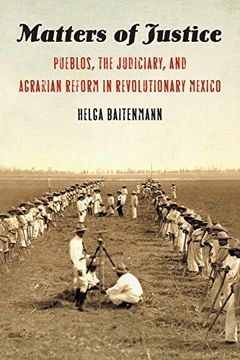Share
Matters of Justice: Pueblos, the Judiciary, and Agrarian Reform in Revolutionary Mexico (The Mexican Experience) (in English)
Helga Baitenmann (Author)
·
University Of Nebraska Press
· Paperback
Matters of Justice: Pueblos, the Judiciary, and Agrarian Reform in Revolutionary Mexico (The Mexican Experience) (in English) - Helga Baitenmann
$ 33.16
$ 35.00
You save: $ 1.84
Choose the list to add your product or create one New List
✓ Product added successfully to the Wishlist.
Go to My WishlistsIt will be shipped from our warehouse between
Thursday, May 30 and
Friday, May 31.
You will receive it anywhere in United States between 1 and 3 business days after shipment.
Synopsis "Matters of Justice: Pueblos, the Judiciary, and Agrarian Reform in Revolutionary Mexico (The Mexican Experience) (in English)"
After the fall of the Porfirio Díaz regime, pueblo representatives sent hundreds of petitions to Pres. Francisco I. Madero, demanding that the executive branch of government assume the judiciary's control over their unresolved lawsuits against landowners, local bosses, and other villages. The Madero administration tried to use existing laws to settle land conflicts but always stopped short of invading judicial authority. In contrast, the two main agrarian reform programs undertaken in revolutionary Mexico--those implemented by Emiliano Zapata and Venustiano Carranza--subordinated the judiciary to the executive branch and thereby reshaped the postrevolutionary state with the support of villagers, who actively sided with one branch of government over another. In Matters of Justice Helga Baitenmann offers the first detailed account of the Zapatista and Carrancista agrarian reform programs as they were implemented in practice at the local level and then reconfigured in response to unanticipated inter- and intravillage conflicts. Ultimately, the Zapatista land reform, which sought to redistribute land throughout the country, remained an unfulfilled utopia. In contrast, Carrancista laws, intended to resolve quickly an urgent problem in a time of war, had lasting effects on the legal rights of millions of land beneficiaries and accidentally became the pillar of a program that redistributed about half the national territory.Helga Baitenmann is an associate fellow of the Institute of Latin American Studies at the University of London. She is the coeditor of Decoding Gender: Law and Practice in Contemporary Mexico.
- 0% (0)
- 0% (0)
- 0% (0)
- 0% (0)
- 0% (0)
All books in our catalog are Original.
The book is written in English.
The binding of this edition is Paperback.
✓ Producto agregado correctamente al carro, Ir a Pagar.

